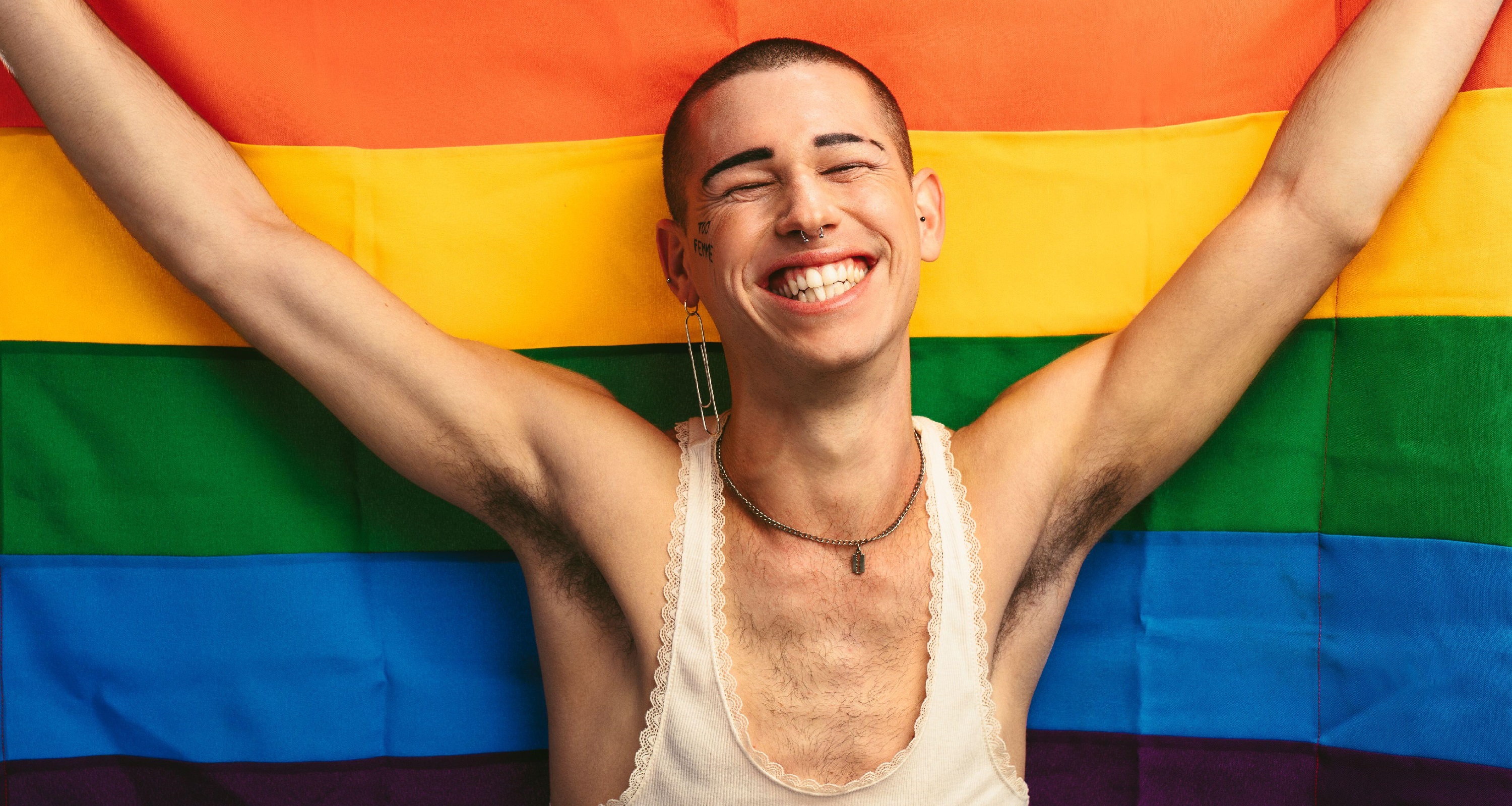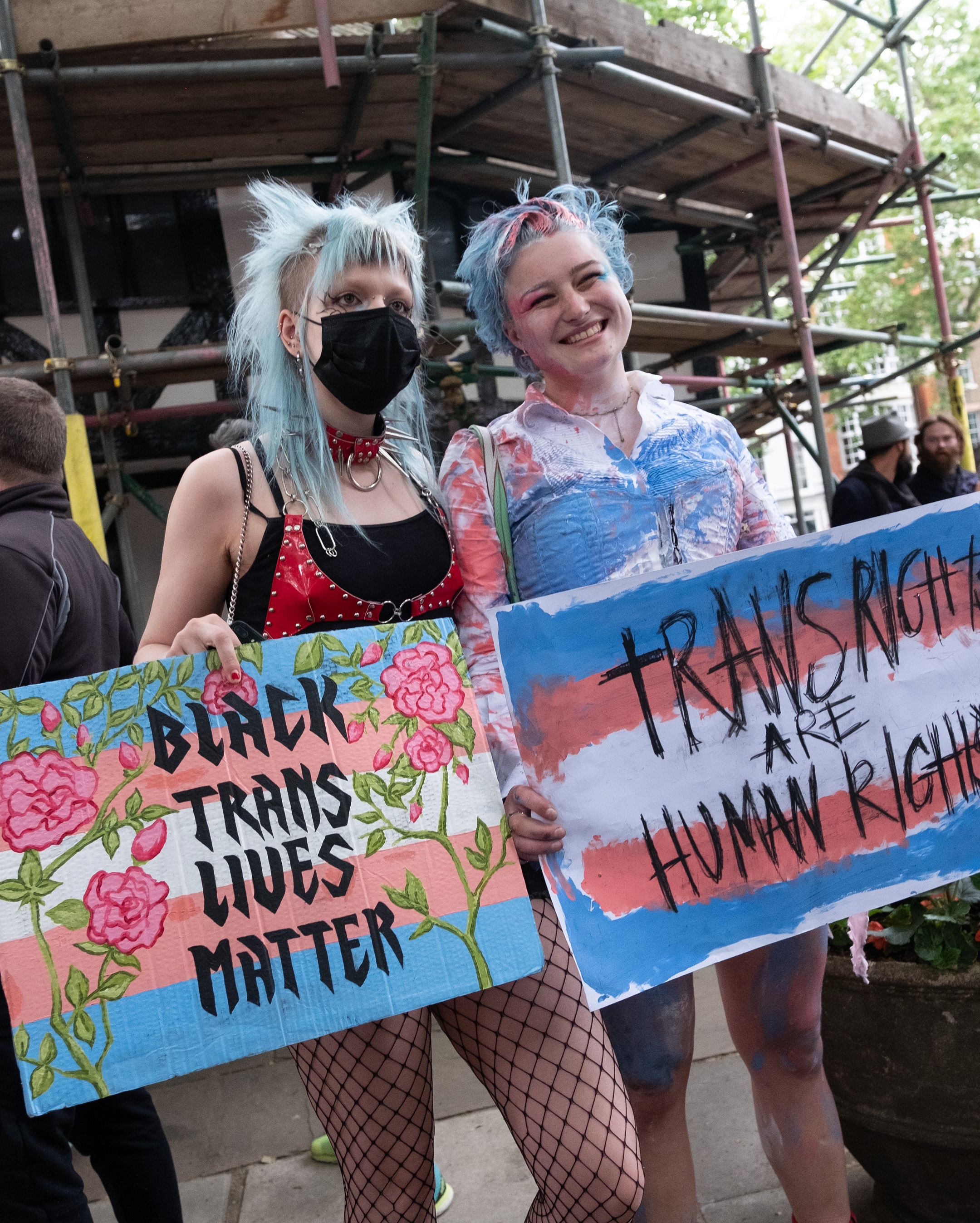Move over, dysphoria – it’s time to celebrate gender euphoria
Trans and non-binary experiences are often framed exclusively through suffering and hardship. It's time to focus on the joy, too.
By Will Stroude

Words: Cait Findlay; Image: Jacob Lund / Alamy Stock Photo
When Laura Kate Dale won a wedding in a competition from a train company, it meant more to her than finally getting to marry her wife and indulging in her obsession with trains.
“We had a very lengthy delay to getting married due to the nonsense in the UK with getting a gender recognition certificate,” she says. “But there was something really magical about having a very affirming day where I got to be feminine and the centre of attention. It’s hard to put into words quite how special that day felt.”
Laura describes her wedding day as an example of ‘gender euphoria’ – a feeling of affirmation and joy from a positive experience relating to gender. It’s a feeling she has experienced in her personal life as a transgender woman, as well as a concept that she is keen to share with others in her writing. In 2021, she published an anthology of essays titled Gender Euphoria, which brought together stories of gender-affirming experiences from trans and non-binary people.
The term gender euphoria has been increasingly used by trans and non-binary communities over the last three years, to express happiness and joy relating to someone’s physical and social experiences of gender: how they feel in their body, and how that body is recognised in the world. It is understood as the antithesis to the more widely-known concept of gender dysphoria, which is a clinical term to describe discomfort and unhappiness related to one’s gender assigned at birth.
Gender dysphoria is “easier for people to understand in the context of binary trans people and medical transition”, says Jake Edwards. Jake is a communications manager at a charity, who has documented parts of his gender journey on YouTube. “There is something radical about focusing on the joy that trans people experience. Less radical within the community – we’re just waiting for people to catch up to the idea that gender euphoria is an extremely important part of being trans.”
Jake believes that the focus on gender dysphoria over gender euphoria among trans and non-binary people has arisen from how trans stories are told in the media, as well as the rigours of the medical system. “People think, why would you transition for something positive?” he asks. “Because you can just live without that, right?”
Laura agrees, saying that gender dysphoria is “an important descriptive term”, but that it has “come to be seen by many people as the defining thing of being trans”. This is partly because a diagnosis of gender dysphoria marks the start of their journey in the healthcare system for many trans people. Gender dysphoria in children, adolescents, and adults is clinically defined in the DSM-5, a diagnostic manual used by psychiatrists and other medical professionals. This gives the term an authority that its opposite is yet to achieve – and may never reach. Dysphoria is more familiar to us for another reason: it is easier to quantify suffering than joy. Many statistics reflect the weighty impact that dysphoria can have on people’s lives; Stonewall has found that almost half of trans people have considered taking their own life.

Image: Unsplash
It is important to note the impact of dysphoria, which is undoubtedly worsened by lengthy waiting lists and hostile public attitudes towards trans people. However, to focus solely on the hardships omits many trans and non-binary experiences – and compounds the well-worn narrative that to be trans is to suffer. The reason that Laura collated the Gender Euphoria anthology was to combat this. “Because so few collections of positive trans experiences exist”, she says, “it felt important to say that there are lots of different experiences of being trans. All of them can be positive, joyous experiences.”
Gender euphoria is often experienced individually, but seeing other people experience it can have a ripple effect on the broader community. Theo* is a writer and emergency services dispatcher, who calls the feeling of gender euphoria a “small victory”. They say, “in recognising moments of joy and gender affirmation, we can lift ourselves and our communities up”. After seeing one of their friends start taking testosterone and glow with gender-affirmed happiness, Theo was able to reflect on what they wanted. They ultimately realised that starting on hormones was the next step in their gender journey. “It’s such a cool positive moment when you’re just looking at a selfie and you go, ‘oh wow. That’s me. I love this’,” they say.
So gender euphoria is a sense of joy, of appreciating one’s self (and one’s selfies), which can be entirely separate from how someone is perceived in the world. Theo says that gender euphoria can also come from “passing in public”, or hearing someone use the correct pronouns; others describe “being directed to the correct toilets or changing rooms”. More broadly, these experiences make people feel like they are accepted and that they belong.
It sounds so simple. But in the current media climate, so many stories of trans lives are told as a tragedy – partly out of necessity, to emphasise the very real barriers to gender-affirming healthcare. So it’s no wonder that there’s little room for variations on the narrative. When the trans community spends so long, as Laura puts it, “putting out fires” of bigotry and disinformation, it sucks all the air from stories that spark joy.
As more people identify and name gender euphoria as a motivating factor in their gender journeys, conversations around gender will continue to shift. Having seen more trans people, particularly those who are younger and more online, describe euphoria as a primary part of their transitions, Laura hopes that “more people will have examples of trans people just being happy being themselves”.
Jake believes that things can, and will, improve over time. “There will be people that say ‘gender euphoria doesn’t make you trans, you have to have gender dysphoria’,” he says. “But it doesn’t have to hold any negativity. It doesn’t have to hold any fear, any self-hate. Gender euphoria is incredibly valid. And it’s a blessing.”
*Theo wished to be referred to by their first name only.
